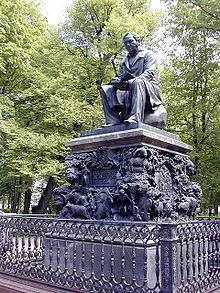- Ivan Andreyevich Krylov
-
 Bronzestatue Iwan Krylows im St.Petersburger Sommergarten von Peter Clodt von Jürgensburg
Bronzestatue Iwan Krylows im St.Petersburger Sommergarten von Peter Clodt von JürgensburgIwan Andrejewitsch Krylow (russisch Иван Андреевич Крылов, wiss. Transliteration Ivan Andreevič Krylov; * 2. Februarjul./ 13. Februar 1769greg. in Moskau; † 9. Novemberjul./ 21. November 1844greg. in Sankt Petersburg) gilt als der bedeutendste Fabeldichter der russischen Literatur.
Krylow war Sohn eines Offiziers. Er war kleiner Beamter, Hauslehrer und Bibliothekar in Sankt Petersburg.
Seine insgesamt mehr als 200 Fabeln erschienen zwischen 1809 und 1843. Im Jahre 1842 erschien auch eine Ausgabe seiner Fabeln in deutscher Sprache.
Krylows Fabeln waren zu Beginn seiner schriftstellerischen Arbeit recht frei von den Arbeiten Äsops und Jean de La Fontaine inspiriert. Dies war nur am Anfang seines Schaffens der Fall, sämtliche späteren Werke sind seine eigenen. Da er in der russischen Umgangssprache schrieb, die auch der einfache Mensch verstand, ist eine Reihe seiner Verse in Russland zu Sprichwörtern geworden.
Weblinks
- Literatur von und über Iwan Andrejewitsch Krylow im Katalog der Deutschen Nationalbibliothek
- Ausgewählte Texte
Personendaten NAME Krylow, Iwan Andrejewitsch ALTERNATIVNAMEN Крылов, Иван Андреевич (russisch); Krylov, Ivan Andreevič (wissenschaftliche Transliteration) KURZBESCHREIBUNG russischer Fabeldichter GEBURTSDATUM 13. Februar 1769 GEBURTSORT Moskau STERBEDATUM 21. November 1844 STERBEORT Sankt Petersburg
Wikimedia Foundation.

